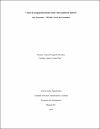Centro de integración urbano-rural “intercambio de saberes” San Cayetano – El Zulia, Norte de Santander
Resumen
Un equipamiento cultural y social puede promover la integración de los campesinos con los habitantes urbanos, fortaleciendo el saber tradicional que tienen de su territorio y de las dinámicas productivas, además potenciando el conocimiento formal. Este espacio ayuda a reforzar la relación con el entorno, es un punto de encuentro para ellos, de tal modo que tengan un lugar donde puedan aprender y a la vez tengan un espacio de esparcimiento donde mejorar las condiciones de vida social. En este equipamiento los campesinos y los habitantes urbanos comparten saberes tradicionales, conocimientos formales y habilidades que tengan, aprendiendo el uno del otro, generando además integración social en espacios de recreación y e intercambio. El lote a intervenir fue seleccionado por su relación con el río, ya que este elemento natural es muy importante para la comunidad debido a que hace parte de su cultura y lo identifican como elemento de producción, pero además de recreación. Adicionalmente tiene relación directa con la vía principal que conecta con Cúcuta y los demás municipios de la parte occidental del departamento y, está ubicado en área destinada para la cultura y recreación, sin afectar ninguna área protegida del área rural. Se propone una alameda sobre las vías principales, la cual tendrá permanencias, ciclo rutas, bici parqueaderos, módulos de intercambio de transporte y puntos de hidratación cada 500 metros. El proyecto busca generar una integración mediante el concepto de la naturaleza y la ruralidad, dándole significado al campo y articulándolo con las dinámicas de la ciudad.
Abstract
Cultural and social equipment can promote the integration of peasants with urban dwellers, strengthening the traditional saber they have of their territory and productive dynamics, in addition to enhancing formal knowledge. This space helps to have a relationship with the environment, it is a meeting point for them, so that they have a place where they can learn and at the same time have a recreational space to improve social living conditions. In this equipment, farmers and urban dwellers share knowledge, formal knowledge and skills they have, learning from each other, also generating social integration in recreation and exchange spaces. The lot to be intervened was selected for its relationship with the river, since this natural element is very important for the community because it is part of its culture and identifies it as an element of production, but also recreation. It also has a direct relationship with the main road that connects with Cúcuta and the other municipalities of the western part of the department and is located in the area destined for culture and recreation, without affecting any protected area of the rural area. A mall is proposed on the main roads, which will have stays, cycle routes, bike parking, transport exchange modules and hydration points every 500 meters. The project seeks to generate integration through the concept of nature and rurality, giving meaning to the countryside and articulating it with the dynamics of the city.
Palabras clave
Collections
 This work is licensed under a Creative Commons Reconocimiento-NoComercial 4.0.
This work is licensed under a Creative Commons Reconocimiento-NoComercial 4.0.

